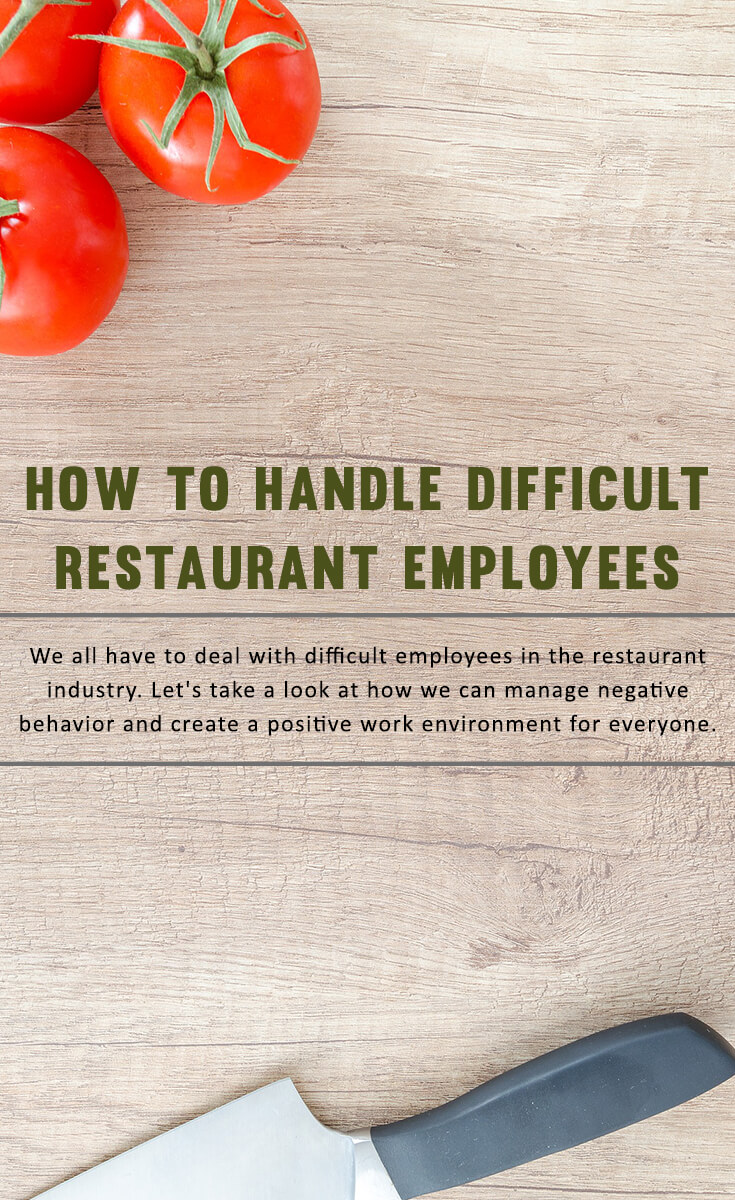We all have to deal with difficult employees in the restaurant industry. Let’s take a look at how we can manage negative behavior and create a positive work environment for everyone.
Look, the restaurant business is often challenging and the pressure to perform can go from zero to sixty in 4.6 seconds. We count on our staff to perform and improvise solutions at the drop of a hat. The importance of being on time, showing up with a winning attitude, and being able focus on tasks is a huge factor in determining the success of a shift. Yet — some people can’t seem to get it together. Always late; creates negative energy; section falling apart. Often times that’s only the tip of the iceberg. When tempers flare, frustrations mount and check/tip averages drop — the warm fuzzy feeling at staff meal have all but disappeared.
So, how do we deal with a problem employee? Is it possible to create a workplace that is positive, productive, and fun? Here are some tips and strategies for handling employees that perform poorly:
Use positive language You learn a lot about a person by observing their body language. Do they seem frustrated? Indifferent? Hostile? Many times we can gauge a person’s mood by watching how they enter the door and begin their shift. Take a moment to say hi. Ask about their day or weekend. You’d be surprised how this ‘small’ gesture can have a calming effect if they seem stressed or frazzled. You start off on a good note and help set the tone for the shift. On the flip side, it can cheer someone up if they seem depressed, fatigued, or low on energy. Restaurants are often tight-knit families. Take a minute or two out of your busy day to pass on a kind word. Show a genuine interest in their world outside of work. Sometimes the negative behavior displayed at work is carried over from the world outside those walls. The same approach can work when they are in the weeds and got triple sat on a busy Friday night. Keep a calm, friendly tone. Keep it light. Choose your words with care and make them count. You will be surprised at the amount of confidence you can build in your server/busser/bartender with a simple, “you got this but I’m here to jump in if you need anything.”
Fair, firm, and understanding Many people have poor time management skills. They make every attempt to show up on time, but — stuff happens. Traffic really does suck. The babysitter really is late… all the time. A raccoon really did eat their radiator belt (one allowance only for this excuse). It’s a hectic world. Be compassionate. But also let them know that being on time or keeping a neat station is important. Help them to understand: this is a team effort and an orchestrated dance. You will be surprised to find out how many people simply don’t understand the relevance of being prompt and punctual. Break it down for them in simple, easy terms. When you let an employee or coworker know that a certain action is valuable to the entire effort, they feel important. Everyone likes to feel important.
Be proactive Does your employee lack motivation? Find out what sparks their interest. Is it music? Fashion? Movies? When you establish a connection with hard to handle employees you build trust. We all understand the importance of trust and how it can lead to an overall improvement in attitude, performance, and workplace cohesiveness. Observe the behavior or habits that need to be corrected and address them early on — before they become a larger problem. Help them to discover better alternatives by walking through ‘mock scenarios’ during pre-shift. It’s possible that their section is always a disaster because no one has ever taught them how to work smarter by consolidating steps. Perhaps previous jobs did not emphasize orderliness and cleanliness. We can’t assume that previous employers have given everyone on your team the small nuggets of wisdom that make tasks easier and build reliable skill sets. You have to be that person. This is what distinguishes a leader from a manager.
Lead by example Let your team see that you care: you will never ask them to perform a task that you wouldn’t do yourself. When they see that you care deeply about the success of the business — they will adopt your habits. Difficult team members notice when you hop behind the bar, run orders, bus and reset tables when the team is in the weeds. And they will reciprocate. A team that feels you are involved with them throughout the shift will be more likely to step up their game. They become empowered and make fewer mistakes . When morale is high, your team members will go the extra mile to meet your vision. Teams that works together and observe strong leadership traits will be able to hold it together during the rough patches — the real nitty-gritty. They understand your expectations and adopt them as their own. They encourage coworkers that are not performing to do better.
The compliment sandwich We all know how delicious this sandwich can be if it’s served at the right temperature. Served cold — not so tasty. Throwing a couple of half-assed compliments on a plate and pouring some criticism gravy over the entire dish is not an effective management technique. It leaves a struggling employee confused and less receptive to feedback. The goal is to take negative behavior/habits and turn them into positive ones. Be sincere and genuine in your compliments — restaurant workers can spot b.s. a mile away. Suggest ways to fix the problem; ask for suggestions; listen to feedback and absorb their responses. As a manager and leader your tone should say, “I will try my hardest to help you.” Criticism is easy to dish out. Often vague, harsh and counterproductive — the result is rarely pleasant or informative. An effective leader will seek a favorable outcome and help to carry out effective solutions. Identify the specific actions you would like to change and give a clear and insightful path to meet those goals.
Employees are your best resource Your strongest assets are waiting to be cultivated. A healthy and positive work environment creates a sense of purpose and translates to an increase in sales, productivity, and happiness.







